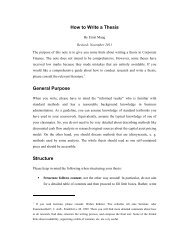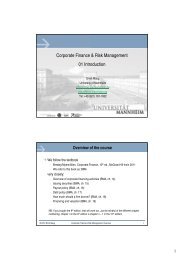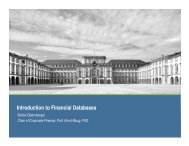- Page 1 and 2: www.thomson.com/financial Worldscop
- Page 3 and 4: Issue 6 3 Table of Contents Introdu
- Page 5 and 6: Applications Issue 6 Historical Gro
- Page 7 and 8: Database Methodology Available Form
- Page 9 and 10: Issue 6 Introduction to Worldscope
- Page 11 and 12: Timeliness Issue 6 Introduction to
- Page 13 and 14: Some Notes on this Section Quick Re
- Page 15 and 16: Issue 6 Frequently Asked Questions
- Page 17 and 18: 1. IS INFORMATION ON ACQUISITIONS A
- Page 19: Issue 6 Frequently Asked Questions
- Page 23 and 24: Issue 6 Frequently Asked Questions
- Page 25 and 26: 26. HOW DOES WORLDSCOPE HANDLE COMP
- Page 27 and 28: Issue 6 Frequently Asked Questions
- Page 29 and 30: Issue 6 Frequently Asked Questions
- Page 31 and 32: ADR Frequently Asked Questions 1. W
- Page 33 and 34: Banks Template Notes: #: Currently
- Page 35 and 36: 19574 Product Segment 8 - Capital E
- Page 37 and 38: 05501 Cash Flow per Share 05502 Cas
- Page 39 and 40: 03481 Capital Surplus 03492 Revalua
- Page 41 and 42: 01351 Foreign Currency Translation
- Page 43 and 44: 04447 Other Uses - Financing 04799
- Page 45 and 46: 19784 Summary As Reported Year- -4
- Page 47 and 48: 09421 Dividend Yield - Close 09411
- Page 49 and 50: Five Year Averages 15181 Demand Dep
- Page 51 and 52: 19642 Geographic Segment 5 - Operat
- Page 53 and 54: 20244 Dividends per Share - Mult Sh
- Page 55 and 56: Monthly Foreign Exchange Rates 1101
- Page 57 and 58: 07022 SIC Code 2 07023 SIC Code 3 0
- Page 59 and 60: 07016 Latest Annual Updated 07013 Y
- Page 61 and 62: 18389 Accumulated Depreciation - P
- Page 63 and 64: 18188 Deferred Domestic Income Tax
- Page 65 and 66: 04828 Increase/Decrease in Income T
- Page 67 and 68: 18816 Pension Data - Actual Return
- Page 69 and 70: Declared Date DPS - Record Date DPS
- Page 71 and 72:
Three Year Averages 08581 Market Ca
- Page 73 and 74:
Five Year Averages 08105 Quick Rati
- Page 75 and 76:
20042 Market Price - Year End - Mul
- Page 77 and 78:
20501 Type of Share - Mult Share 6
- Page 79 and 80:
Notes: #: Currently U.S. and Canadi
- Page 81 and 82:
19573 Product Segment 8 - Assets 19
- Page 83 and 84:
05486 Tangible Book Value per Share
- Page 85 and 86:
18290 Redeemable Preferred Stock 03
- Page 87 and 88:
04401 Long Term Borrowings 04701 Re
- Page 89 and 90:
18805 Pension Data - Expected Long-
- Page 91 and 92:
Monthly Price Information Issue 6 M
- Page 93 and 94:
08356 Interest Rate - Estimated Ave
- Page 95 and 96:
19602 Geographic Segment 1 - Operat
- Page 97 and 98:
20147 Price/Book Value Ratio - Clos
- Page 99 and 100:
20620 Common Shares Outstanding - C
- Page 101 and 102:
Other Financial Companies Template
- Page 103 and 104:
19574 Product Segment 8 - Capital E
- Page 105 and 106:
05491 Book Value - Outstanding Shar
- Page 107 and 108:
03492 Revaluation Reserves 03493 Ot
- Page 109 and 110:
Funds Flow Statement per FASB 95 04
- Page 111 and 112:
04851 Increase/Decrease in Cash & S
- Page 113 and 114:
19776 Summary As Reported EPS Dil.
- Page 115 and 116:
09300 Price/Book Value Ratio - High
- Page 117 and 118:
08421 Capital Expenditures % Sales
- Page 119 and 120:
19653 Geographic Segment 6 - Assets
- Page 121 and 122:
20301 Type of Share - Mult Share 4
- Page 123 and 124:
11010 To U.S. Dollars - September M
- Page 125 and 126:
05200 Earnings Report Frequency 051
- Page 127 and 128:
09111 Price/Earnings Ratio - High 0
- Page 129 and 130:
09145 Price/Earnings Ratio - GAAP -
- Page 131 and 132:
Fast Update Template BANKS Notes: #
- Page 133 and 134:
03051 Short Term Debt & Current Por
- Page 135 and 136:
08601 Earnings per Share Growth 086
- Page 137 and 138:
11557 Indicator - Restatement Type
- Page 139 and 140:
Funds Flow Statement - per FASB 95
- Page 141 and 142:
08356 Interest Rate - Estimated Ave
- Page 143 and 144:
11557 Indicator - Restatement Type
- Page 145 and 146:
Funds Flow Statement - per FASB 95
- Page 147 and 148:
08385 Cash Earnings Return on Equit
- Page 149 and 150:
05255 Earnings per Share - Last 12
- Page 151 and 152:
18171 Unconsolidated/Parent Company
- Page 153 and 154:
08241 Common Equity % Total Assets
- Page 155 and 156:
19531 Product Segment 4 - Sales 195
- Page 157 and 158:
03426 Minority Interest 03451 Prefe
- Page 159 and 160:
09205 Earnings Yield - Current Low
- Page 161 and 162:
INDUSTRIALS Notes: #: Only availabl
- Page 163 and 164:
08001 Market Capitalization 05201 E
- Page 165 and 166:
Other Fields 04500 External Financi
- Page 167 and 168:
Profitability Annual Statistics 083
- Page 169 and 170:
05350 Date of Fiscal Period End 053
- Page 171 and 172:
05301 Common Shares Outstanding 053
- Page 173 and 174:
DPS - Extra - Rec Date DPS - Extra
- Page 175 and 176:
08211 Minority Interest % Total Cap
- Page 177 and 178:
05601 Ticker Symbol 06004 CUSIP 060
- Page 179 and 180:
04890 Net Cash Flow - Financing 048
- Page 181 and 182:
09301 Price/Book Value Ratio - Low
- Page 183 and 184:
Interim Time Series Template BANKS
- Page 185 and 186:
03056 Securities Sold under Repurch
- Page 187 and 188:
05191 Common Shares Used to Calcula
- Page 189 and 190:
Growth Rates 08698 Net Sales/Revenu
- Page 191 and 192:
Income Statement 01001 Net Sales or
- Page 193 and 194:
OTHER FINANCIALS General Informatio
- Page 195 and 196:
18263 Trailing Twelve Months Net Pr
- Page 197 and 198:
Issue 6 Accounting Standards Accoun
- Page 199 and 200:
Accounts Payable Issue 6 Alphabetic
- Page 201 and 202:
Accumulated Depreciation - Land Iss
- Page 203 and 204:
Data for this field is generally no
- Page 205 and 206:
Accumulated Depreciation % Gross Fi
- Page 207 and 208:
This item is only available for ADR
- Page 209 and 210:
Issue 6 Alphabetical List of Field
- Page 211 and 212:
Asset Disposal Issue 6 Alphabetical
- Page 213 and 214:
Issue 6 Canada S&P/TSX Composite In
- Page 215 and 216:
Book Value Per ADR - GAAP - Current
- Page 217 and 218:
Book Value Per Share - 3 Yr Annual
- Page 219 and 220:
Capital Adequacy Ratio - Tier 1 Iss
- Page 221 and 222:
Capital Surplus Issue 6 Alphabetica
- Page 223 and 224:
Cash & Equivalents - Generic Issue
- Page 225 and 226:
Cash Dividends % Cash Flow Leverage
- Page 227 and 228:
Issue 6 Alphabetical List of Field
- Page 229 and 230:
Issue 6 Alphabetical List of Field
- Page 231 and 232:
Common/Ordinary Shareholders Issue
- Page 233 and 234:
Common Equity - GAAP Issue 6 Alphab
- Page 235 and 236:
Issue 6 Alphabetical List of Field
- Page 237 and 238:
Common Stocks Issue 6 Alphabetical
- Page 239 and 240:
Computer Software - Accumulated Amo
- Page 241 and 242:
Issue 6 Alphabetical List of Field
- Page 243 and 244:
Current Assets - Total Issue 6 Alph
- Page 245 and 246:
Current Portion Of Long Term Debt I
- Page 247 and 248:
Date Added To Product Issue 6 D Sup
- Page 249 and 250:
Decrease in marketable securities (
- Page 251 and 252:
Issue 6 Alphabetical List of Field
- Page 253 and 254:
Negotiable Orders of Withdrawal (NO
- Page 255 and 256:
Issue 6 Alphabetical List of Field
- Page 257 and 258:
Discontinued Operations Issue 6 Alp
- Page 259 and 260:
Dividend Payout (% Earnings) - Tota
- Page 261 and 262:
Dividend Yield - 3 Yr Avg -Close Is
- Page 263 and 264:
Issue 6 Alphabetical List of Field
- Page 265 and 266:
Issue 6 Alphabetical List of Field
- Page 267 and 268:
Issue 6 Alphabetical List of Field
- Page 269 and 270:
Issue 6 Alphabetical List of Field
- Page 271 and 272:
Dividends Provided For Or Paid - Co
- Page 273 and 274:
Earnings Before Interest, Taxes and
- Page 275 and 276:
Issue 6 Alphabetical List of Field
- Page 277 and 278:
W No standard text Earnings Per Sha
- Page 279 and 280:
Issue 6 Alphabetical List of Field
- Page 281 and 282:
Issue 6 Alphabetical List of Field
- Page 283 and 284:
Issue 6 Alphabetical List of Field
- Page 285 and 286:
Earnings Yield - GAAP - Low Stock P
- Page 287 and 288:
Earnings Yield - 3 Yr Avg - High Is
- Page 289 and 290:
Employees - 1 Yr Annual Growth Grow
- Page 291 and 292:
Issue 6 Alphabetical List of Field
- Page 293 and 294:
Equity % Total Deposits Leverage Ra
- Page 295 and 296:
Exchange Rate Used In Translating B
- Page 297 and 298:
Issue 6 Alphabetical List of Field
- Page 299 and 300:
Fax Number Issue 6 F Descriptive Da
- Page 301 and 302:
Fiscal Year 12 Month Average Exchan
- Page 303 and 304:
Other Financial Companies: Internat
- Page 305 and 306:
Foreign Office Deposits % Total Dep
- Page 307 and 308:
Issue 6 Alphabetical List of Field
- Page 309 and 310:
Gain On Sale Of Investment Suppleme
- Page 311 and 312:
Issue 6 Alphabetical List of Field
- Page 313 and 314:
Headline Earnings Per Share Stock D
- Page 315 and 316:
Healthcare Data - Net Periodic Pens
- Page 317 and 318:
I/B/E/S Ticker Descriptive Data, Cu
- Page 319 and 320:
Issue 6 Alphabetical List of Field
- Page 321 and 322:
Issue 6 Alphabetical List of Field
- Page 323 and 324:
Issue 6 Alphabetical List of Field
- Page 325 and 326:
Increase/Decrease In Short Term Bor
- Page 327 and 328:
Issue 6 Alphabetical List of Field
- Page 329 and 330:
Indicator - Sponsored/Unsponsored I
- Page 331 and 332:
Issue 6 4040 Government & Defense E
- Page 333 and 334:
Issue 6 6440 Printers 6450 Miscella
- Page 335 and 336:
Insurance Reserves - 5 Yr Annual Gr
- Page 337 and 338:
Interest Expense On Debt Issue 6 Al
- Page 339 and 340:
Interest Income On Bank Deposits Is
- Page 341 and 342:
Interest/Dividends On Securities Av
- Page 343 and 344:
Issue 6 Alphabetical List of Field
- Page 345 and 346:
R. Includes discontinued operations
- Page 347 and 348:
Invested Assets % Liabilities - 5 Y
- Page 349 and 350:
Investments - GAAP Issue 6 Alphabet
- Page 351 and 352:
Investor Relations - Phone/Fax Issu
- Page 353 and 354:
Length Of Fiscal Period Issue 6 Alp
- Page 355 and 356:
Loans - 5 Yr Annual Growth Issue 6
- Page 357 and 358:
Issue 6 Alphabetical List of Field
- Page 359 and 360:
Loss Adjustment Expense Issue 6 Alp
- Page 361 and 362:
Market Capitalization - Current Iss
- Page 363 and 364:
Market Capitalization/Trailing Twel
- Page 365 and 366:
Issue 6 Alphabetical List of Field
- Page 367 and 368:
Market Value See MARKET CAPITALIZAT
- Page 369 and 370:
Issue 6 Mortgage backed securities
- Page 371 and 372:
Issue 6 376 Israel 826 United Kingd
- Page 373 and 374:
Net Income (U.S.$) Issue 6 Alphabet
- Page 375 and 376:
Footnotes: A. No standard text C. C
- Page 377 and 378:
Net Interest Income % Average Depos
- Page 379 and 380:
Issue 6 Alphabetical List of Field
- Page 381 and 382:
Issue 6 Alphabetical List of Field
- Page 383 and 384:
Net Sales/Revenues - 1 Yr Annual Gr
- Page 385 and 386:
Non-Interest Income % Total Revenue
- Page 387 and 388:
Non-Redeemable Preferred Stock Issu
- Page 389 and 390:
Operating Income Before Depreciatio
- Page 391 and 392:
Data for this field is generally no
- Page 393 and 394:
Other Cash Flow Issue 6 Alphabetica
- Page 395 and 396:
Other Intangibles - Net Issue 6 Alp
- Page 397 and 398:
Footnotes: A. Includes other provis
- Page 399 and 400:
Issue 6 Alphabetical List of Field
- Page 401 and 402:
Other Sources/(Uses) - Financing Is
- Page 403 and 404:
Par Value Issue 6 P Stock Data, Ann
- Page 405 and 406:
Pension/Post Retirement Benefits Is
- Page 407 and 408:
This item is only available in the
- Page 409 and 410:
Pension Data - Prior Service Costs
- Page 411 and 412:
Footnotes: D. Net of ESOP tax benef
- Page 413 and 414:
Premiums Earned Issue 6 Alphabetica
- Page 415 and 416:
Price Trend - Quarter To Date Stock
- Page 417 and 418:
Price/Book Value Ratio - GAAP - Cur
- Page 419 and 420:
Price/Book Value Ratio - Low Stock
- Page 421 and 422:
Price/Earnings Ratio - Avg High-Low
- Page 423 and 424:
Price/Earnings Ratio - GAAP - Low S
- Page 425 and 426:
Price/Earnings Ratio - 3 Yr Avg - H
- Page 427 and 428:
Issue 6 Alphabetical List of Field
- Page 429 and 430:
Footnotes: A. Includes intangibles
- Page 431 and 432:
It includes but is not restricted t
- Page 433 and 434:
Ratio Of Total Loans To Total Capit
- Page 435 and 436:
Issue 6 Alphabetical List of Field
- Page 437 and 438:
Reinsurance & Adjustment Reserves I
- Page 439 and 440:
Rental Income Issue 6 Alphabetical
- Page 441 and 442:
Reserve For Loan Losses % Total Ass
- Page 443 and 444:
Return On Assets Issue 6 Alphabetic
- Page 445 and 446:
Return On Equity - Per Share - Curr
- Page 447 and 448:
Risk Weighted Assets Issue 6 Alphab
- Page 449 and 450:
Savings/Other Time Deposits Liabili
- Page 451 and 452:
Issue 6 Alphabetical List of Field
- Page 453 and 454:
Separate And Variable Account Liabi
- Page 455 and 456:
Issue 6 Alphabetical List of Field
- Page 457 and 458:
Issue 6 BYTE ABBREVIATION EXCHANGE
- Page 459 and 460:
Issue 6 BYTE INDEX COUNTRY 23 FTSE/
- Page 461 and 462:
Issue 6 Reverse Splits Stocks (Curr
- Page 463 and 464:
Tangible Book Value Per Share Stock
- Page 465 and 466:
Ticker Symbol - Mult Share 1, 2, 3,
- Page 467 and 468:
Total Assets (U.S.$) Issue 6 Alphab
- Page 469 and 470:
Total Debt % Common Equity Issue 6
- Page 471 and 472:
Goodwill/Cost in excess of net asse
- Page 473 and 474:
Total Liabilities Issue 6 Alphabeti
- Page 475 and 476:
Total Premiums Written Issue 6 Alph
- Page 477 and 478:
Trading Volume (Weekly Average $ Am
- Page 479 and 480:
Trailing Twelve Months Net Sales/Re
- Page 481 and 482:
Treasury Stock Issue 6 Alphabetical
- Page 483 and 484:
Unappropriated (Free) Reserves Issu
- Page 485 and 486:
Issue 6 Alphabetical List of Field
- Page 487 and 488:
Footnotes: A. No standard text Unre
- Page 489 and 490:
Weighted Cost Of Debt Issue 6 W Sup
- Page 491 and 492:
Issue 6 Alphabetical List of Field





